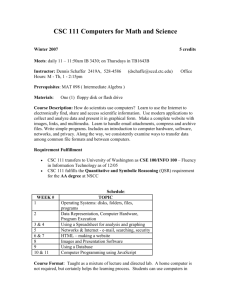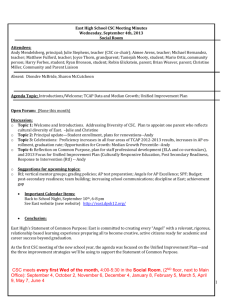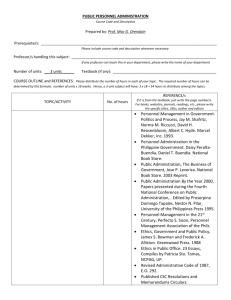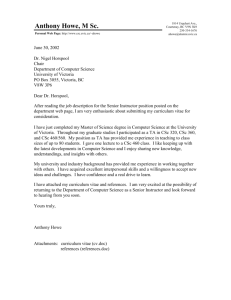TD United Nations Conference
advertisement
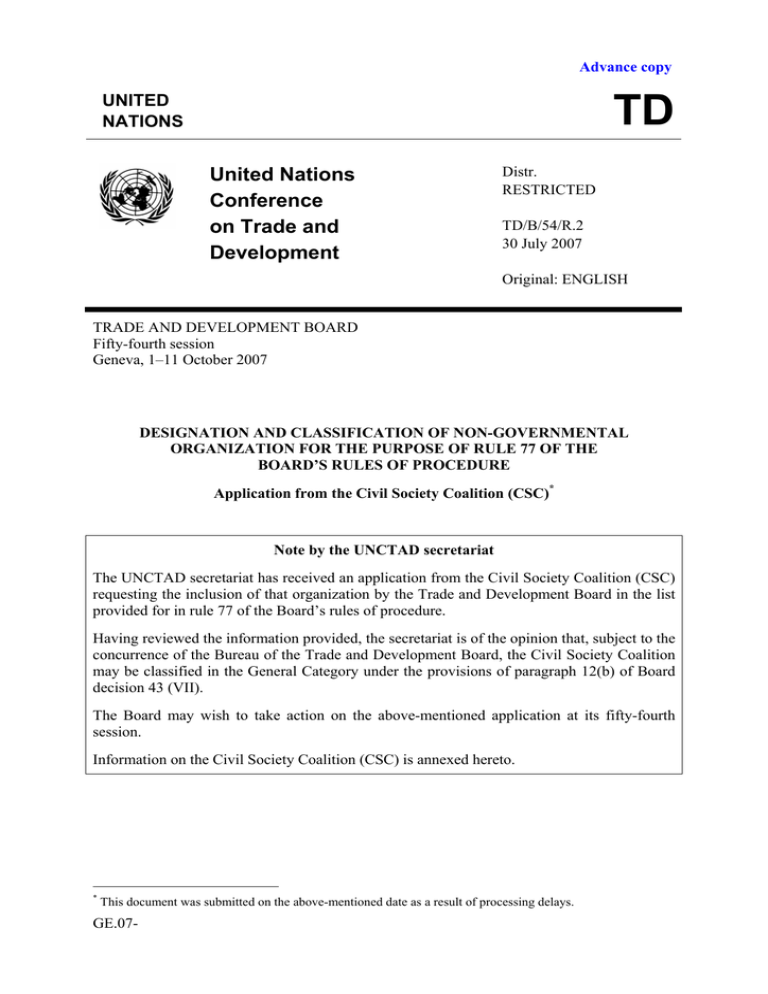
Advance copy TD UNITED NATIONS United Nations Conference on Trade and Development Distr. RESTRICTED TD/B/54/R.2 30 July 2007 Original: ENGLISH TRADE AND DEVELOPMENT BOARD Fifty-fourth session Geneva, 1–11 October 2007 DESIGNATION AND CLASSIFICATION OF NON-GOVERNMENTAL ORGANIZATION FOR THE PURPOSE OF RULE 77 OF THE BOARD’S RULES OF PROCEDURE Application from the Civil Society Coalition (CSC)* Note by the UNCTAD secretariat The UNCTAD secretariat has received an application from the Civil Society Coalition (CSC) requesting the inclusion of that organization by the Trade and Development Board in the list provided for in rule 77 of the Board’s rules of procedure. Having reviewed the information provided, the secretariat is of the opinion that, subject to the concurrence of the Bureau of the Trade and Development Board, the Civil Society Coalition may be classified in the General Category under the provisions of paragraph 12(b) of Board decision 43 (VII). The Board may wish to take action on the above-mentioned application at its fifty-fourth session. Information on the Civil Society Coalition (CSC) is annexed hereto. * This document was submitted on the above-mentioned date as a result of processing delays. GE.07- TD/B/54/R.2 page 2 Annex Background information on the Civil Society Coalition (CSC) History 1. The Civil Society Coalition (CSC) was created in July 2001 in order to facilitate greater citizen and civil society participation in global trade and standard-setting bodies, and in particular to facilitate greater participation of stakeholders representing consumer interests, including those that are concerned with public health, intellectual property, access to knowledge, competition policy, human rights and development. Aims and objectives 2. The CSC is a network of 30 public interest non-governmental organizations (NGOs) from more than 12 developing and industrialized countries, dedicated to facilitating greater citizen and civil society participation in global trade and standard bodies, and in particular to facilitating greater participation of stakeholders representing consumer interests, including those that are concerned with public health, intellectual property, access to knowledge, competition policy, human rights and development. 3. The members of CSC include groups that are working in areas such as trade, public health, development, agriculture and issues relating to access to knowledge. 4. The CSC seeks to increase civil society participation in UNCTAD proceedings, and in particular to increase participation of consumer and citizen interests. Membership 5. Members meet by electronic conferencing in January every year and on an ad hoc basis throughout the rest of the year as circumstances prescribe. Attendance at meetings is paid for by each member. The members vote each year in their January meeting for the members of the new Steering Committee. Voting is done by simple ballot, and Steering Committee members are appointed by simple majority. 6. The CSC Steering Committee changes in January each year, following a vote of the membership to appoint a new committee. Voting is conducted as described above. The Steering Committee corresponds electronically and telephonically to make decisions on interventions in international forums on behalf of the CSC, and on applications for membership. Structure 7. General Assembly: Because the members are spread around the globe, they meet by electronic conferencing. 8. The Steering Committee: The CSC Steering Committee changes in January each year, following a vote of the membership to appoint a new Committee. TD/B/54/R.2 page 3 9. The Steering Committee for January to December 2007 is as follows: James Love, Consumer Project on Technology, United States HeeSeob Nam, IPleft, Republic of Korea Achal Prabhala, Alternative Law Forum, India Sangeeta Ahashikant, Third World Network, Malaysia Robert Weissman, Essential Action, United States 10. The CSC secretariat: The CSC maintains a small secretariat in Geneva, which facilitates participation of civil society on trade and standard-setting meetings. The secretariat prepares, on behalf of members, applications for accreditation and representation before appropriate global trade and standard-setting bodies. Relations with other international organizations 11. The CSC has permanent observer status at the World Intellectual Property Organization. It also has been accredited to the World Trade Organization Ministerial Conference in Cancun, Mexico and Hong Kong, China. Financial resources 12. All expenses of the CSC are donated by its members on a voluntary basis. Publications 13. As a virtual organization, the CSC publishes on its website different statements of the CSC at international forums and an annual progress report. Liaison Officer 14. Mr. Thiru Balasubramaniam will liaise with UNCTAD. Civil Society Coalition c/o Consumer Project on Technology 1, Route des Morillons CP 2100 1211 Geneva 2 Tel: +41 22 791 6727 E.mail: thiru@cptech.oeg Headquarters address: Civil Society Coalition c/o Consumer Project on Technology 1621 Connecticut Ave. NW #500 Washington, D.C. 20009 Tel: +1 202 332 2670 Fax: +1 202 332 2673 E.mail: manon.ress@cptech.org Working language 15. The working language of the CSC is English.
